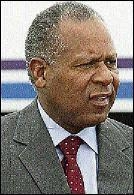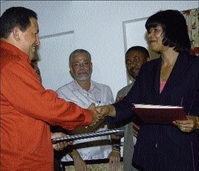CARICOM's energy policy in limbo
Published: Sunday | June 28, 2009

Hylton
It cannot be easily controverted that the People's National Party (PNP) administration recognised and was proactive in addressing the energy challenges facing Jamaica. Through a series of actions taken by the P.J. Patterson administration and continuing under Portia Simpson Miller, the administration demonstrated its astute understanding of the urgent necessity to confront the energy challenges.
My appointment in 2001 as the minister of mining and energy, after serving for several years in the Ministry of Foreign Affairs and Foreign Trade, ensured that focused attention was brought to bear immediately on the need for finding urgent solutions to the high price of energy, the lack of diversification in fuel type and source, as well as the inefficiencies in the power generation and distribution systems. Our mandate was to begin in earnest to revamp the energy infrastructure of the country and to devise new policies and programmes addressing energy diversification, including renewable energy.
It was clear from the analysis that liquefied natural gas (LNG) had the superior advantages of its relative abundance, its stable pricing regime, its efficiency and environmental friendliness. Work on the energy policy had begun and was to result in an energy Green Paper which has since languished under the current administration.
REGIONAL INITIATIVES

Manning
My earlier participation in the negotiation of the Revised Treaty of Chaguaramas gave me an appreciation of the nexus between trade policy and energy policy and their relationship with the proposed single market and economy (CSME) as embodied in the Treaty.
We immediately raised with the Government of Trinidad & Tobago (T&T) ITS pricing policy with respect to natural gas, and more generally with respect to energy products domestically. We pointed out the discriminatory treatment of energy and energy products sold in T&T, and the treatment given to the rest of the region, including Jamaica. Apart from denying that energy prices to sectors and entities were subsidised as a result of its industrial policy, the T&T government argued that energy and energy pricing were not covered in the Revised Treaty, even though the treaty by its terms provided that the collective resources of the region should be available to the region's people on a non-discriminatory basis.
After exhaustive discussions within the councils of CARICOM, the Jamaican government decided that its best option was to invoke the good offices of the CARICOM Secretary General in order to have the matter resolved.
In due course, the general counsel of CARICOM issued his opinion, on behalf of the secretary general, addressing the range of issues that were raised by the parties. Among the opinions posited by the general counsel was the view that Article 7 of the treaty prohibited discrimination in the treatment of CARICOM nationals by a member state in the exercise of a right or freedom recognised by the treaty.
It further expressed the view that a Jamaican national had the right to purchase energy and energy products at a non-discriminatory price from T&T Government owned and operated monopoly anywhere within the Single Market, as long as the transport and other associated costs are paid by the purchaser. This in response to the argument put forward by the T&T government, that CARICOM nationals had to first establish businesses in Trinidad &Tobago in order to benefit from the cheaper priced gas available in Trinidad & Tobago's domestic market.
The crucial question of whether natural gas sold in Trinidad & Tobago was a 'like product' to LNG requested by Jamaica was sidestepped in the opinion on the basis of inadequate technical information.
regasification

Venezuelan President Hugo Chavez and then Jamaica's Prime Minister Portia Simpson Miller shake hands after signing a memorandum of understanding for Venezuela to supply two million tons of liquefied natural gas to Jamaica beginning in 2009. The amount was deemed adequate to supply Jamaica's bauxite and energy sectors. The signing took place at the Half Moon hotel in Montego Bay on March 12, 2007. Looking on are Donald Buchanan (centre) and Philip Paulwell. - File
The simple fact is that liquefying natural gas is merely an economical means of transporting the gas over long distances, as exists between Jamaica and Trinidad & Tobago. In any event, we pointed out that the LNG would have to undergo regasification before being used in Jamaica. Significantly, we made it clear that Jamaica was fully prepared to pay all extra processing and transport costs involved in getting gas to Jamaica.
The matters remain unsettled because Trinidad & Tobago's prime minister, Patrick Manning, expressed his dissatisfaction with the opinion and advised the Heads of Government Conference that he intended to appeal the matter in the CARICOM Court of Justice (CCJ) once it became functional, which has yet to occur despite the functioning of the CCJ for some time now.
Given T&T's rejection of the secretary general's good offices, the Jamaican government officially placed on the agenda for the consideration of CARICOM Heads the urgent matter of a regional energy policy, which was accepted. Among the issues to be addressed in the regional energy policy was the matter of investment in the sector, energy security, alternative energy and of course pricing of energy and energy products within the region.
A committee was established, chaired by T&T at technical level, with the mandate to develop the regional energy policy and strategy and report to Heads. Several meetings were held and significant progress made on a range of issues. However, on the questions of energy security and pricing of energy and energy products no movement was made, as Jamaica insisted that a non-discriminatory pricing mechanism must be put in place, while T&T insisted that the market should decide the issue despite its monopoly, or near monopoly, of the T&T domestic supply market.
A memorandum for the supply of approximately 1.1 million tonnes of gas per annum for a 20-year period was eventually signed between T&T and Jamaica with a pricing formula below commercial prices. The memorandum was, however, unilaterally set aside by T&T on the basis that it did not have the quantity of gas needed to supply Jamaica's needs, as previously committed to.
Energy as an Instrument of Foreign Policy
Before PetroCaribe, the discussion of energy security for the CARICOM region centred largely on T&T's resources as the region's only exporter of energy and energy products.
It should come as no surprise that T&T, not unlike any other energy producer, sees its energy supplies as a key instrument of its foreign and domestic policies. The key question for T&T to answer is: how does its nationalistic stance on energy square with its commitment to a regional project such as the CSME?
It is Jamaica's and other CARICOM countries contention that Trinidad & Tobago's pricing policy regarding energy and energy products is discriminatory and gives an unfair advantage to its productive sector, especially its manufacturing sector, against which other CARICOM producers must compete in the single market at a structural disadvantage.
Currently, over 80 per cent of the LNG produced in Trinidad & Tobago is for delivery into the US markets, thus supplying as much as 70 per cent of US's LNG import needs. A fact that Trinidad & Tobago has never failed to remind the Americans of, both publicly and privately. Indeed, this has been the source of Trinidad & Tobago's sustained lobbying efforts for the US to grant it special preferential access into the US market for certain products as a quid pro quo for satisfying US's energy security. So far, the US has resisted this bilateral arrangement sought by Trinidad & Tobago to the exclusion of its other CARICOM partners.
PetroCaribe
President Hugo Chavez's offer of a financing facility for energy and energy products to the non-energy producing members of CARICOM was regarded suspiciously by T&T and seen as undermining its energy position in the Caribbean markets where it had enjoyed near monopoly status for many, many years. Even when the T&T government realised the boldness and attractiveness of the PetroCaribe offer, it continued to be disparaging of the offer and to warn CARICOM beneficiary countries of the lack of security that the offer provided. In time, Trinidad & Tobago muted its public pronouncements but remained unalterably opposed to the agreement.
Some of the opposition from the T&T government, it turns out, has to do with unresolved issues with Venezuela regarding oil and gas exploration in an area called the Plataforma Deltana that borders Venezuela and is known to have significant proven reserves. Trinidad & Tobago had long coveted an agreement with Venezuela which would allow it to exploit the gas in this sector on its and Venezuela's behalf and then process it in its LNG facilities, the only processing facilities of its kind in the Americas at this point of time.
The T&T administration sought Jamaica's intervention with President Chavez to urge him to sign a Unification Agreement with Trinidad & Tobago on exploration of gas in the joint border area and for processing the gas belonging to Venezuela in T&T's facilities. This came to be the quid pro quo for obtaining T&T's acquiescence in the PetroCaribe arrangement.
I am satisfied that Jamaica discharged its responsibility under the terms of the informal understandings between T&T and Jamaica. Indeed, this informal understanding included the promise to secure all the natural gas required by Jamaica from this source. The gas would be liquefied at processing facilities in T &T and shipped to Jamaica.
The failure of President Chavez and Prime Minister Manning to conclude their discussions and sign an agreement on the exploration of gas from the border area is, I believe, the real reason that T&T pulled back from its memorandum of understanding to supply Jamaica with LNG.
THE WAY FORWARD
The two ways open for Jamaica to proceed with obtaining LNG supplies from T&T other than on a charity basis are:
1. Have the CCJ declare T&T's pricing arrangements concerning its sale of natural gas to domestic entities discriminatory and a breach of the Revised Treaty of Chaguaramas; or
2. To persuade President Chavez to conclude the Unification Agreement with T&T, from which Jamaica's long-term supply of gas could be guaranteed and LNG uplifted from the T&T liquefaction facilities.
Alternatively, LNG may be obtained from other sources, including the Middle East and ultimately from Venezuela itself, when a planned liquefaction facility is finally built.
With respect to the CCJ adjudicating on the matter as referenced above, the Jamaican private sector has a private right of action under conditions provided for in the Treaty of Chaguaramas and reaffirmed in a recent ruling by the CCJ, involving Trinidad Cement Limited (TCL) and the government of Guyana, upholding TLC's right to bring an action for damages against any CARICOM government acting in breach of the treaty.
This would require the Government of Jamaica to bring into force domestically the law implementing the treaty, which it has so far failed to do.
It remains open for the Government of Jamaica to engage both the Venezuelan and Trinidad & Tobago governments in discussions which could lead to a settlement of the border issue between them, which could result in the enhanced security of Jamaica's energy future.
Does the leadership and political will exists in the current administration and/or the private sector?
G. Anthony Hylton is former minister of foreign affairs & foreign trade and minister of mining & energy.
